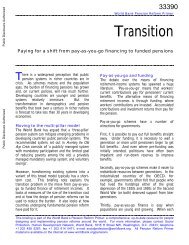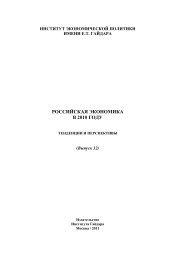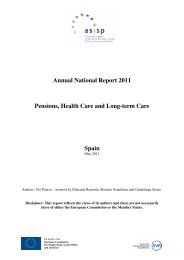Financial Sector Development in Africa: Opportunities ... - World Bank
Financial Sector Development in Africa: Opportunities ... - World Bank
Financial Sector Development in Africa: Opportunities ... - World Bank
Create successful ePaper yourself
Turn your PDF publications into a flip-book with our unique Google optimized e-Paper software.
112 Walley<br />
the current situation alongside future demand will allow for a gap analysis<br />
to be performed. Such an analysis will provide the basis for the f<strong>in</strong>al,<br />
forward-look<strong>in</strong>g section of the chapter. It will attempt to set out a recommendations<br />
framework of ways the gap <strong>in</strong> hous<strong>in</strong>g and the f<strong>in</strong>anc<strong>in</strong>g of<br />
hous<strong>in</strong>g can be bridged.<br />
Lessons and recommendations will be based on the data presented<br />
<strong>in</strong> this chapter, on experience work<strong>in</strong>g <strong>in</strong> <strong>Africa</strong>n countries and other<br />
countries—both developed and emerg<strong>in</strong>g economies—and by highlight<strong>in</strong>g<br />
some of the success stories that are already tak<strong>in</strong>g place <strong>in</strong> <strong>Africa</strong>. There are<br />
many positive developments that could be the spark for bigger movements<br />
and replication <strong>in</strong> new markets. Above all, however, this chapter aims to<br />
provide some enlightenment on the path out of the crisis and toward the<br />
longer-term f<strong>in</strong>anc<strong>in</strong>g of hous<strong>in</strong>g <strong>in</strong> <strong>Africa</strong>. As will be shown, hous<strong>in</strong>g<br />
f<strong>in</strong>ance systems are cha<strong>in</strong>s conta<strong>in</strong><strong>in</strong>g many l<strong>in</strong>ks, each of which must be<br />
strong and play its part for the system as a whole to prosper. This chapter<br />
is therefore directed to lenders, developers, and policy makers as well as<br />
the myriad other stakeholders that, each <strong>in</strong>dividually, have a role to play <strong>in</strong><br />
promot<strong>in</strong>g an efficient hous<strong>in</strong>g f<strong>in</strong>ance system on the <strong>Africa</strong>n cont<strong>in</strong>ent.<br />
Demand for Hous<strong>in</strong>g F<strong>in</strong>ance<br />
All hous<strong>in</strong>g is f<strong>in</strong>anced <strong>in</strong> some form or other. Hous<strong>in</strong>g can be f<strong>in</strong>anced<br />
through a mortgage, sav<strong>in</strong>gs, hous<strong>in</strong>g microf<strong>in</strong>ance, or <strong>in</strong>vestment capital or<br />
through the imputed value of one’s own labor. Given the size of the<br />
expense that typically represents the largest purchase of any household, it<br />
makes sense to extend the f<strong>in</strong>anc<strong>in</strong>g period as long as possible to improve<br />
affordability. However, <strong>in</strong> <strong>Africa</strong> the absence of long-term funds has <strong>in</strong>hibited<br />
the growth of hous<strong>in</strong>g f<strong>in</strong>ance and other forms of f<strong>in</strong>anc<strong>in</strong>g requir<strong>in</strong>g<br />
long-term money. This leaves many households with their only option: to<br />
build <strong>in</strong>crementally with the purchase of raw materials com<strong>in</strong>g out of any<br />
surplus <strong>in</strong> each paycheck. This is typically a slow, <strong>in</strong>efficient way of construct<strong>in</strong>g<br />
hous<strong>in</strong>g, and it elim<strong>in</strong>ates any economies of scale that could be<br />
achieved from buy<strong>in</strong>g materials <strong>in</strong> bulk. It also means that the “hous<strong>in</strong>g<br />
good” can be consumed only right at the end of the f<strong>in</strong>anc<strong>in</strong>g period, rather<br />
than from the outset with a traditional mortgage loan.<br />
Formal f<strong>in</strong>anc<strong>in</strong>g of hous<strong>in</strong>g <strong>in</strong> <strong>Africa</strong> has been limited to date.<br />
Figure 4.1 shows that—with the exception of South <strong>Africa</strong>, Namibia, and<br />
some of the North <strong>Africa</strong>n countries—mortgage f<strong>in</strong>ance barely registers<br />
as an asset class <strong>in</strong> the <strong>Africa</strong>n f<strong>in</strong>ancial system. As a cont<strong>in</strong>ent, mortgage<br />
debt outstand<strong>in</strong>g to GDP is around 10 percent, which compares to







